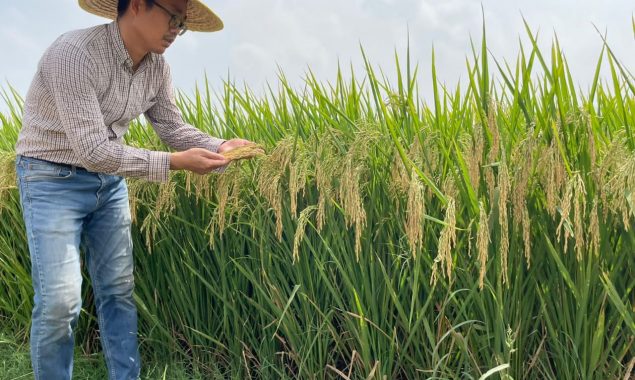
LAHORE: Growers of the basmati rice are likely to get the much-awaited hybrid seeds, which are capable of doubling the yield, compared to the available varieties in the next two to three years.
The Guard Agricultural Research and Services (Guard Agri) has already started field trials for its ‘hybrid basmati’ seed to provide disease-resistant, long-grain, non-sticky aromatic traditional variety with a higher per acre yield to paddy growers of Punjab.
Guard has sown hybrid basmati variety over 50 acres in the core basmati growing districts of Narowal, Gujranwala and Hafizabad.
Shahzad Ali Malik, chief executive officer of Guard Agri and Guard Group of Companies director, said: “Guard is the pioneer in introducing hybrid coarse rice. Our researchers started working in collaboration with the Chinese scientists to introduce hybrid basmati varieties with the same traits, as basmati is known for better per acre yield. We developed one seed after seven years of research and the same was put on trial a year ago.”
“On completion of a two-year field trial, the results will be placed before the variety evaluation committee (VEC) working under the Pakistan Agriculture Research Council (PARC) for getting recommendations for the commercial marketing of the hybrid basmati seed,” he said.
“In just two years after completion of the process, the hybrid seed would be made available to the growers for cultivation,” Malik added.
Sharing results of a one-year trial, he said an extra-long grain hybrid variety with average grain length of 8.2mm has given more than 70 maunds/acre yield. The present non-hybrid basmati varieties are not producing more than 35 maunds to 40 maunds/acre, posing a threat of invasion by the hybrid coarse rice onto the basmati areas due to higher yield.
“Hybrid varieties of the coarse rice had already made their mark, especially in Sindh, where the growers are getting 130 to 140 maunds/acre. As such, there was a threat of invasion of the coarse hybrid varieties on core basmati grown areas,” he said.
“Our research was aimed at avoiding such scenarios in the core basmati grown areas. Now, the hybrid seed of basmati has given encouraging results,” Malik said, adding that two more basmati seeds had also been chosen for two-year field trials.
“These two varieties are 8.2mm and 8.3mm of average grain length having the potential of giving 80-90 maunds/acre yield. Both these varieties could be available for cultivation just one year after the commercial marketing of the first one,” he said.
To a question about the presence of traditional basmati aroma in the newly-developed hybrid variety, Malik said that this quality was not a major demand of the consumers these days.
“People demand extra-long grains of non-sticky rice. Aroma is not a major issue, as most people prefer biryani and pulao. To get a specific traditional fragrance, you need to boil rice,” he said, adding that there was aroma in the new variety, though not that much, compared with the present non-hybrid varieties.
He also refuted the claims that hybrid rice needs more water, compared with the traditional varieties, saying the situation was entirely opposite.
“[The] gap between the sowing and harvesting of traditional varieties is 120 days. For the hybrid rice, it is 90 to 100 days. As such, you need fewer watering days, while cultivating hybrid rice,” Malik said.
Liu Linhui, in-charge of the Longping High-Tech Agriculture Company for the Pakistani market, expressed the hope that the hybrid basmati would bring revolution in the core basmati grown areas in Punjab like the coarse varieties did in Sindh and south Punjab.
“[The] results of a one-year field trial of the hybrid basmati are encouraging. We hope that the variety would get a recommendation of the variety evaluation committee for enlistment soon after completion of the two-year field trials,” he said, adding that the variety would be made available to the growers for cultivation in two years after the enlistment.
Sharing details of the process for the commercial marketing of the locally-produced seeds, Federal Seed Certification and Registration Department regional director Muhammad Azam Khan said that the variety evaluation committee formulate recommendations for the enlistment of a variety after evaluating the results of two-year field trials.
“The PARC enlists a seed for the commercial marketing on the recommendations of VEC, having due representation of different departments and agronomists,” he said, adding that the enlistment was a government go-ahead for the sale of a locally-produced seed.
Catch all the Business News, Breaking News Event and Latest News Updates on The BOL News
Download The BOL News App to get the Daily News Update & Follow us on Google News.




